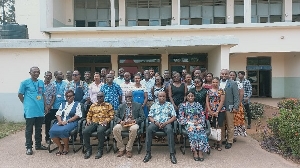A capacity-building workshop for Medical Laboratory Scientists to effectively respond to epidemics of infectious agents and utilize molecular biology methods to improve their diagnosis in Ghana is underway at the Graduate School of Nuclear and Allied Sciences, Accra.
The five-month program is aimed at improving the national preparedness of medical laboratory scientists towards the detection of infectious diseases like COVID-19 in case of future outbreaks in Ghana.
The workshop, organized by the Cellular and Clinical Research Centre of the Radiological and Medical Sciences Research Institute (RAMSRI) of the Ghana Atomic Energy Commission (GAEC), is being funded by the Ghana Skills Development Fund (GSDF).
Speaking at the opening ceremony of the workshop, the Director-General of GAEC, Prof. Samuel Boakye Dampare, assured the participants of hands-on training, which he said would provide them with the necessary skills for both clinical and research pursuits.
“Available data shows that medical laboratories need technology, and laboratory personnel are happy to receive training in molecular diagnosis. Therefore, this short course has been designed to address the skills gaps, boost career progression, and create employment opportunities in the medical laboratory sector of the Ghanaian economy,” he stated.
Prof. Dampare urged the participants to take the lessons from the workshop seriously and contribute meaningfully to the health and well-being of Ghanaians.
On her part, the Course Coordinator, Dr. Edna Dzifa Doe, bemoaned the scarcity of medical laboratory personnel with the needed skills to apply molecular biology techniques to detect infectious agents and attributed it to the insufficient number of universities and research institutions offering such relevant training.
“Research institutions or universities that provide or can provide hands-on training in the application of molecular biology techniques in the diagnosis and detection of bacterial, viral, fungal, and parasitic infections in Ghana are few, and only a limited number of these institutions are engaged in providing this needed service,” she said.
Dr. Doe explained that the inadequate training of medical laboratory personnel in molecular biology techniques somehow hindered the country's ability to manage the COVID-19 outbreak effectively.
“During this critical period, the entire nation had to rely solely on the Noguchi Memorial Institute for accurate testing, which slowed the process. By improving the skills of biomedical laboratory scientists through this workshop, we are strengthening our defenses and ensuring a more agile response to emerging threats,” she added.
The Director of RAMSRI, Prof. Francis Hasford, expressed gratitude to GSDF for their sponsorship, which enabled the institute to acquire the necessary logistics to conduct the training.
The training workshop has five (5) modules in three (3) cohorts and is scheduled to end on the 26th of July 2024.
Health News of Thursday, 21 March 2024
Source: Ghana Atomic Energy Commission
GAEC trains medical laboratory scientists in infectious agents, epidemics and response
Entertainment












